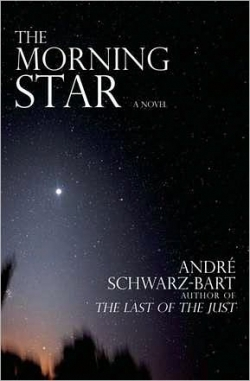
The Morning Star
It would take no less than a poet with an evolved spirit and keen sense of history to add new insights on the Holocaust. Andre Schwarz-Bart (1928–2006), a Polish Jew whose parents and brothers were victims of the Nazis, was just such a man. His best-selling, widely-translated Holocaust novel, The Last of the Just, earned him the Prix Goncourt in 1959. The Morning Star, written in his last days, is perhaps unfinished—“All finishing off is high treason” against the dead, Schwarz-Bart would say. The novel has been pieced together from manuscripts and notes by his widow, Simone. The narrative—particularly the last four chapters—is not entirely seamless, but as a statement and work of art, the work is complete.
In The Morning Star, Haim Yaacov, a Jewish cobbler from the Polish village of Podhoretz, is transformed into a Hassidic folk hero when he discovers an abandoned violin in a rubbish pile. He restores the instrument, uncovers its healing powers, and is later visited by the prophet Elijah, who grants him extraordinary knowledge of the past and future. The legend of Haim Yaacov sets the table for his twentieth-century descendent, Haim Lebke, who has inherited some of the gifts of his ancestor, including the ability to play the flute in such a way that it has a calming effect on everyone within earshot. On September 1, 1939, the Germans invade Poland, and the war is bearing down on Podhoretz. Unlike his beloved family, Haim will survive the Nazi onslaught, but, bearing witness to the unthinkable horrors of the Warsaw ghetto, then Auschwitz, Haim will yearn “to be delivered from the burden of life,” until gradually, over many years after the war, he allows himself to experience a love that is stronger than death.
In pre-Holocaust Podhoretz, Schwarz-Bart presents a harmonious village, steeped in myth, ritual, and continuity. Readers sense the eternal connection, the “I am you and you are me,” as the antithesis of the coming Nazi storm. After the war, in order to reverse his personal trajectory toward disintegration, the aging Haim must reconcile with the living and the dead. On a train to revisit Auschwitz, he encounters a man, with a Jewish mother and West Indian father, who is struggling with these dual origins. The man’s dilemma demonstrates that Jews, like all men, are of two skins, “the unique and the universal.” For the Jew the task is to embrace one’s fellow man without assimilating—without losing one’s Jewishness. Schwarz-Bart’s is a powerful comment on the need for awareness of man’s common origins that transcend nationality and culture.
Reviewed by
Joe Taylor
Disclosure: This article is not an endorsement, but a review. The publisher of this book provided free copies of the book to have their book reviewed by a professional reviewer. No fee was paid by the publisher for this review. Foreword Reviews only recommends books that we love. Foreword Magazine, Inc. is disclosing this in accordance with the Federal Trade Commission’s 16 CFR, Part 255.
